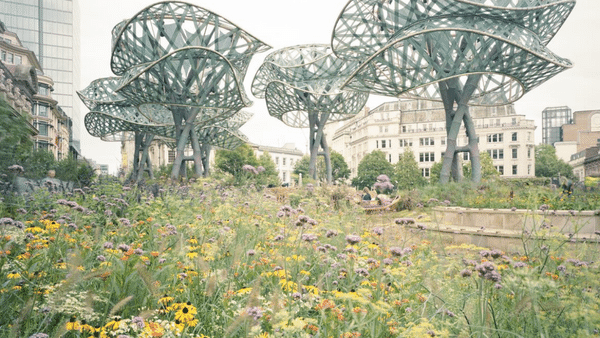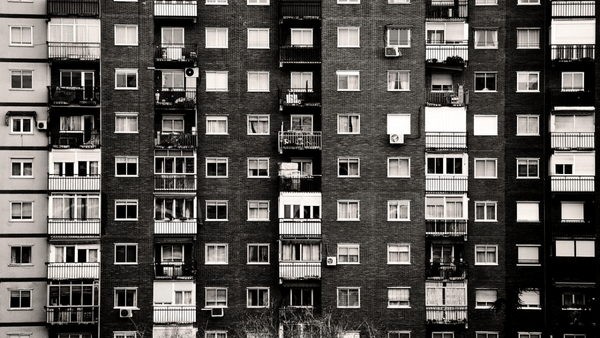Climate change, a cost of living crisis, war in Ukraine, the fallout from Brexit… sometimes it can seem we live in a time of constant uncertainty. But amid the crises, Dr Matthew Barber-Rowell has been finding, curating and nurturing 'Spaces of Hope'
‘Curating Spaces of Hope’ emerged from my journey of suffering and making sense of that suffering. It was a journey encompassing austerity, unemployment, loneliness and isolation, abuse and discrimination. As I travelled, I questioned and explored how what we believe and value relates to how we live, work, and relate to others. Between 2010 and 2020 this evolved from a personal reflection to a social movement. I began to see a way of producing good fruit from these uncertain times, and a way of contributing to post-pandemic society.
In 2017 I was commissioned to deliver networked dialogues in diverse community spaces, using the 'Spaces of Hope' approach. We engaged around 170 people from 70 or so organisations, and ended up with some 300 perspectives on what 'Spaces of Hope' meant to them. The contributors also spoke of the barriers that stopped them realising these 'Spaces of Hope' in their lives. The Inquiry into the Future of Civil Society in England summarised these dialogues as ‘bringing together innovative mixes of civil society actors (from professional community practitioners through to individual community activists) to “meaning-make” as a response to experiences of pointlessness and emptiness in personal, community and professional life’.
So what did they come up with?
65 per cent of respondents associated 'Spaces of Hope' with vulnerability, freedom and social connection. 40 per cent saw suspicions towards different cultures and worldviews as barriers to 'Spaces of Hope'. A third said 'Spaces of Hope' dialogues had catalysed something new within their work. And marvellously, 90 per cent of respondents said they valued the dialogues and would participate in future. Between 2016 and 2019, 35 of these 'Spaces of Hope' dialogues took place.
Then, In 2020, a team led by the William Temple Foundation delivered research mapping pandemic responses by faith groups and local authorities. We found that though uncertainty grew, affinities between local authorities and local groups did too. The research reported: ‘Almost every local authority in the study endorses a commitment to build on this and to deepen relationships supporting long-term policy interventions and partnerships in ways that are different to the current practice and norms.’
We began by drawing out lived experiences of COVID. For example, during the pandemic, morning walks became both acts of obedience (the law allowed one piece of exercise per day), and acts of defiance against the virus, glimpsing forgotten freedoms before we returned to our COVID-induced confines. Loved ones died, weddings were cancelled, jobs were lost, belts were tightened. New frontlines emerged through pop-up hubs providing parcels of hope. Street-level organising and WhatsApp groups nurtured networked responses to COVID chaos, opening up spaces of connection, catalysing alliances and empowering local communities. We looked afresh for symbols of hope, we transitioned to the nowhere office, we mobilised as citizens, embraced (or not) the vision for Levelling Up society, too. Dialogue that draws on these different concerns is timely. But, how do we take things forward through local leadership?
Contributors to 'Spaces of Hope' ranged from refugees and homeless communities, to religious leaders, differently-abled volunteers, CEOs, community workers, academics, council officers, foodbank users and many more. And the research found local leadership characterised in three ways: firstly, it’s incarnational, where the potential we have is made real by the things we do; secondly, it’s negotiated, as we understand what can be done together; and thirdly, it includes different roles and responsibilities – we might be specialists or generalists, but both are needed and both have value.
Local leadership has wider concerns of course: relationships with people and place; our beliefs, values and worldviews; communication online and in person; welcome and care through both voluntary work and professional services, alike; the prophetic and authentic stories unfurling experiences today and offering hope for tomorrow. Local leadership finds the flows of the world around us, nurturing networks, partnership and movements for change.
Next, dialogue opens all of this up. Curating 'Spaces of Hope' offers the following principles. We use this as a ‘compass’ to keep us on track:
Freedom: This is the potential we have within us and the ability we have to make that real and tangible. We take responsibility within our circumstances and share the fullest possible expression of our personality.
Relationship: We are in relationship with everyone and everything around us, from the people we love to the places we live, to the rest of the world as we see it. This helps us to understand the freedom that we have positively, in terms of freedom for others, as opposed to freedom from others.
Service: The expression of freedom, in relationship with others is, service. Service is the incarnation of the potential that we each have. It is also about the many different ways leadership manifests itself.
Affect: Service comes in many forms. All can be both subtle and significant and synonymous with hope. ‘Affect’ is our guide to being aware of and sensitive to everything around us. As the pandemic has taught us, the smallest of sources can bring hope.
Authenticity: Does the freedom we are sharing through our relationship with others (and expressing through service that is affective and affected by what is around us) fit into our wider story? This is not an inward sense of authenticity that we decide on for ourselves, but an outward question for others to answer. Is what we are doing truly hopeful and hope-filled?
A collective response to what has happened to us begins with a conversation. In Liverpool, on 23 June, we are renewing relationships after the pandemic and engaging in dialogue together. If you are in the area, please join us. For more information contact [email protected].
Dr Matthew Barber-Rowell is a Research Fellow with the William Temple Foundation and a Fellow of the Royal Society of Arts. During the pandemic Matthew supported local food provision; packing and delivering food parcels in his local community, acted as a trustee of his local church and was a team member delivering UK wide COVID research

Become an RSA Fellow
The RSA Fellowship is a unique global network of changemakers enabling people, places and the planet to flourish. We invite you to be part of this change.
To correct this error:
- Ensure that you have a valid license file for the site configuration.
- Store the license file in the application directory.
Related articles
-
The Fellow-led Mindful Living Network has relaunched
Fellowship news
The Leads, Tina and Majella, invite Fellows to reconnect with them on Circle, our Fellowship Digital platform
-
Super-nature: shaping how cities feel
Blog
Tamsin Hanke Sash Scott
Super-nature was one of 10 commissions to feature in the 2022 global exploration research project, Collective Futures. Learn about the work and its outputs in this field note.
-
Poor country, rich minority: why young people need a basic income
Blog
Matthew Johnson Elliott Johnson
A universal basic income can alleviate anxiety and depression in young people. Elliott and Matthew Johnson of Northumbria University explore the benefits this kind of economic security can deliver.




Join the discussion
Comments
Please login to post a comment or reply
Don't have an account? Click here to register.
'Spaces of Hope' is certainly a soul touching initiative. Curious to know how did you reach/decide on the principles. They make so much sense that they seem like common sense but I know it's not that easy.
Hind, thank you so much for the comment and apologised for only getting to it now. Your question about the principles is a really good one. These principles were derived from a variety of sources and synthesised through the research that produced the Spaces of Hope model. These sources include: 1) The public theological work of William Temple, whose work inspired citizen engagement as part of the formation of the Welfare State (see Christianity and Social Order, 1976). 2) literatures exploring updates to Temple’s work for a 21st Century context. 3) Between 2016 and 2019, I curated a social movement and community network commission, which i designed and delivered in north west England, where I tested ideas and applications for new principles with attendees. At this point there was a set of 7 principles. 4) ethnographic research where the principles were tested against existing practice within urban contexts. The outcome was that the 7 being tested were refined to the 5 you see. All told there were circa 1000 contributions to this work making it very much a coproduction of the principles for Curating Spaces of Hope. The Spaces of Hope paradigm learns as it grows, so each dialogue and network that i run will have scope to test and retest the applicability of these ideas. As you say, it appears to be common sense in many ways, but it testing it, i think we open up opportunities for new and hopeful opportunities to emerge.